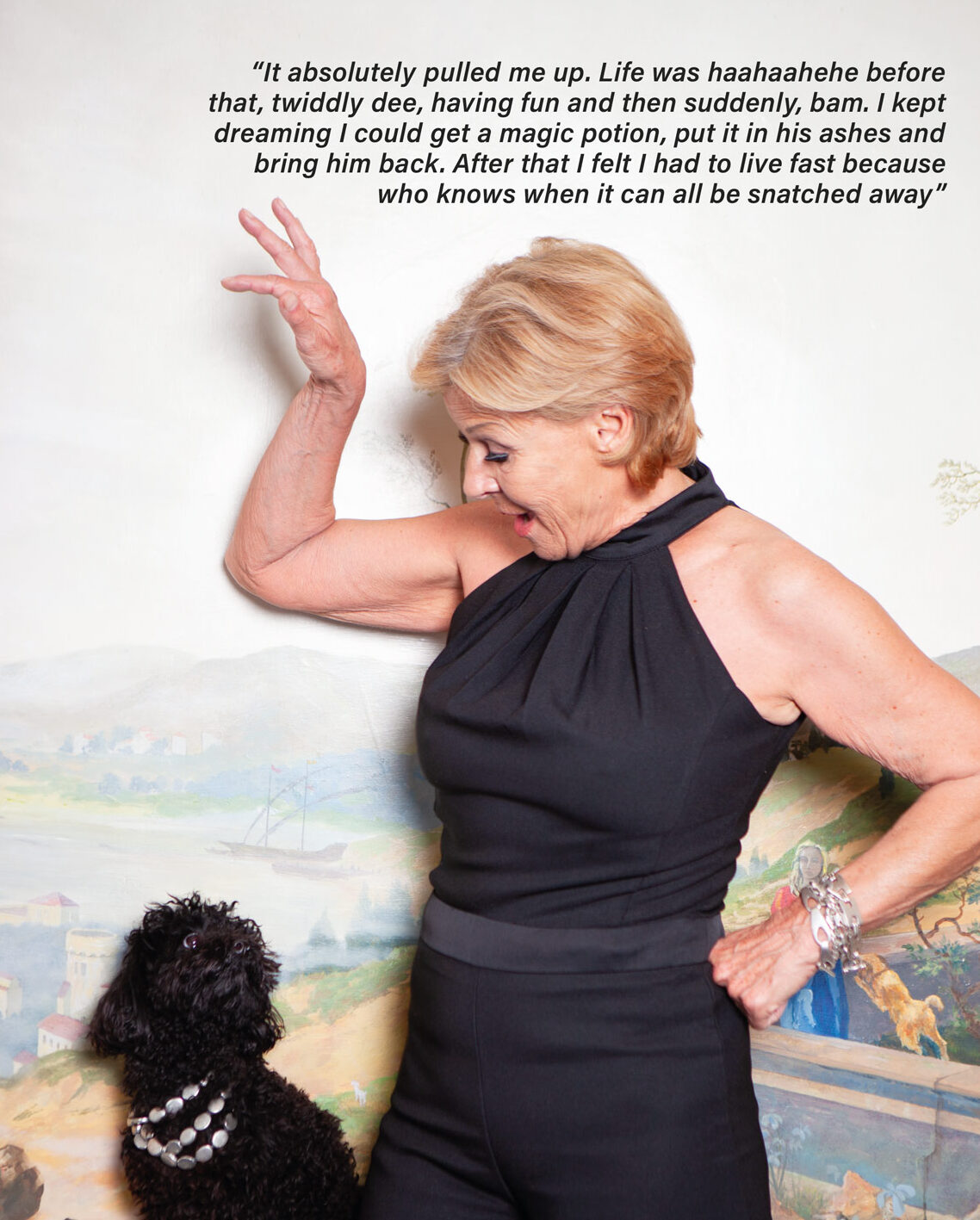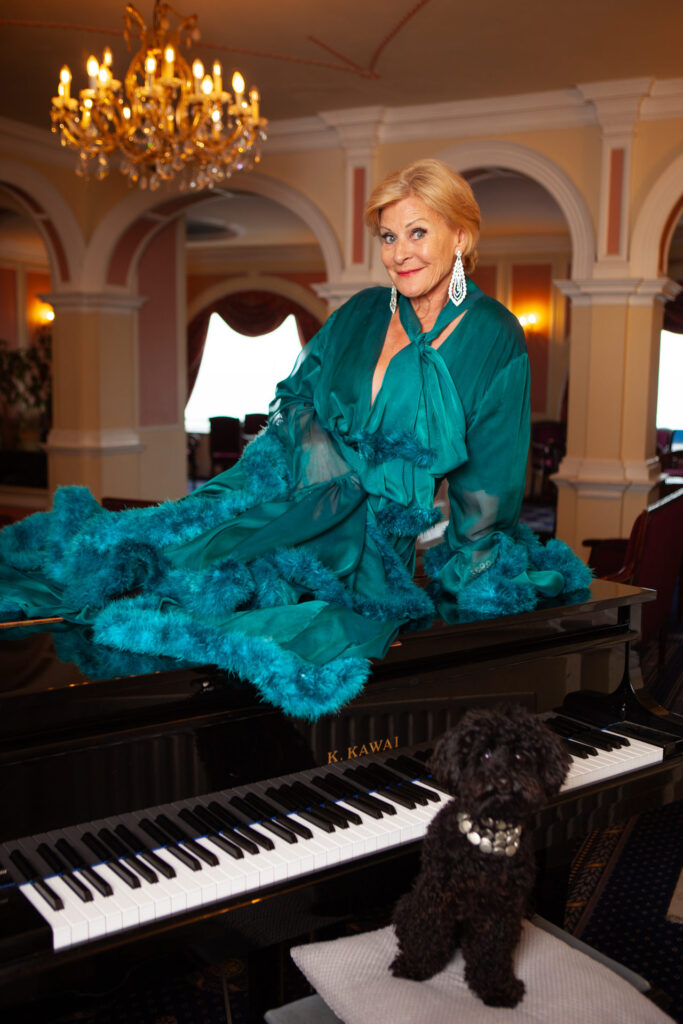Maria McErlane
Photography by Clare Hughes
‘To keep balance, you must keep moving’. It’s Einstein’s words that Maria McErlane quotes in her recent memoir Bumps in the Road, and which are particularly apt for this woman whizzing about our town.
Whether you’ve heard her killer cackle down the beachfront on a sunny day, a charming “Oh shit, sorry darling!” in her velvety voice as she bikes past in the rain, or giving out advice to the masses on her good pal Graham Norton’s radio show, she’s a distinctive but discreet part of this place.
Maria seems like the sort of person who has all bases covered, even if that is a little chaotically. “Life for me has been lived fast. I’m just one of those people; more haste, more speed…more catastrophe, obviously” she says as we sit down for a cuppa, her blinking pooch perched on her lap.
She’s had a fascination with cycling since she was a young girl in Bletchley, when her Dad bought a bike from a bloke in the pub. “It was about escape, seeing that beyond this little council estate there was another life. I had great urgency to discover it”. Thinking about all the different bicycles she’d had throughout her life; inherited ones, found ones, bought ones- and all the places these trusty steeds took her, she had the outline for a memoir, Bumps in the Road. The book is a whirlwindy, whistle-stop tour of a life well lived.

After going to drama school, Maria started out her career in stand-up comedy, “It was a strange bunch of people who didn’t quite fit in. There was ‘the ice man’ who would bring a huge block of ice onstage and carve sculptures, or ‘the jet man’ who would do the sounds of jet engines setting off with his mouth. A lot of very strange characters travelling around the country, tucked up together in the back of a car”. It all sounds pretty bonkers, but that seems to suit Maria just fine. There’s a glorious mischief to her, a constant twinkle in her eye, never taking things too seriously and always up for a giggle. It’s no surprise she went on to grace our screens in a variety of raucous comedies, including The Fast Show.
As with cycling, what goes up comes back down and Maria doesn’t shy away from the difficulties she’s faced. She lost a partner when she was twenty-eight, a particularly heart-breaking chapter of the book (and her life) and one that drastically changed her perspective. “It absolutely pulled me up. Life was haahaahehe before that, twiddly dee, having fun and then suddenly, bam. I kept dreaming I could get a magic potion, put it in his ashes and bring him back. After that I felt I had to live fast because who knows when it can all be snatched away”.
It was a shift of outlook which brought her down this way in 2004. “I wanted to be by the sea, I loved the geographical levels with the two hills, and the sociological levels, it’s interesting here, I didn’t want to live in Tunbridge Wells with pearls and a twin set”. “Graham came to visit me once, we started off at St Clements, ended up at The Admiral Benbow dancing on a sticky carpet to Abba at four in the morning. Someone came up to us and said ‘Graham Norton, what you doing here?’ He said ‘Same as you mate’ and carried on to Dancing Queen”.
To keep balance Maria kept moving forward. She got a dog, (“It’s nice to have another heart-beat about the place!”), made new friends and continued to act, write and bike. “It’s not what happens to you, it’s how you deal with it, where you go from there…easier said than done, but it’s our choice. Shit happens, I’m still going to have a good life… it’s hard…but get back out there and feel the wind in your hair again”.

It’s not just her cycling that is fast, there’s a joy in talking to Maria in that you never really know where you’re going until you’re suddenly there. She’s an immediate and present force “Gosh there’s three trucks outside- I love Taylor Swift, she’s just so squeaky clean, even her leotards aren’t high cut- my dog usually hates blokes but he loves gay men…he has gaydar, how’s that for picking up energy!”
Despite this effervescence, she’s incredibly caring, checking if me and Mel (the editor) are okay, asking as much about our lives as we ask about hers. It’s no wonder this natural empathy (or nosiness as she called it) makes her such a great agony aunt.
She’s been helping to solve the nation’s problems (less on Brexit, more like ‘my boss has bad breath’) for the past thirteen years on Graham Norton’s radio show, which ended earlier this year, much to the dismay of many listeners. “When we first started we thought it would be nonsense problems that we could have a laugh with, but then people started writing in really serious things, I thought ‘Why are you writing to a couple of turns on the radio, talk to your husband!’”
Her slot on the radio was an absolute hit. It didn’t just provide guidance, it was fun and insightful, offering a different outlook. The kind of advice you want from a friend but they probably won’t have the heart to tell you. Her radio presence also acted as somewhat of a public service announcement for Hastings and St Leonards. Until recently, if I didn’t answer the phone to my northern Mum on a weekend, she’d tune into Virgin Radio to get the latest, via Maria. “I hear you’ve got loads of jellyfish in the sea this week/ I hear Debenhams is being turned into a bowling alley/ I hear there’s some green man called Jack who’s escaped from the Fisherman’s museum-some Morris dancers have slayed him on a hill!?!” Etc etc.
Maria’s time as an agony aunt taught her that people in this country just don’t communicate healthily, they’d rather consult a chat show host on the radio than speak to their wife. “Nobody likes confrontation, we’d rather put it into the back of our mind and let it grow into a great lump than confront it when it’s tiny pimple”. The knock-on affect that this has on people’s mental health is clearly a genuine concern for Maria.
“I do wonder how people cope sometimes. People wang on about kindness, I’m not sure if it’s about that, I think it’s about communicating clearly, how we’d wish to be communicated to ourselves”.
Maria seems to model this well, both in her book and her general character. There’s an authenticity and honesty in the way she presents herself to the world. She’s considerate, but not afraid to be herself – warts and all, equally ready to welcome you for whoever you are.
Bumps in the Road is a memoir that looks to the future and encourages us, no matter what life throws our way, to keep moving forwards.
Get Hastings would like to thank The Royal Victoria Hotel, St Leonards, for supplying a stunning backdrop to our photographs.



